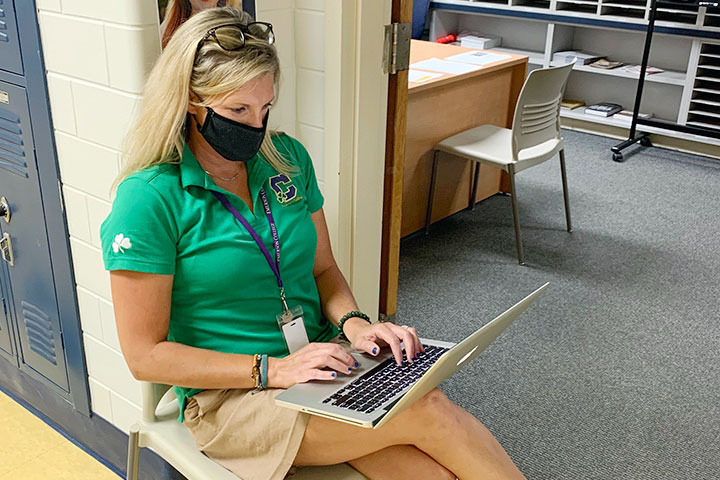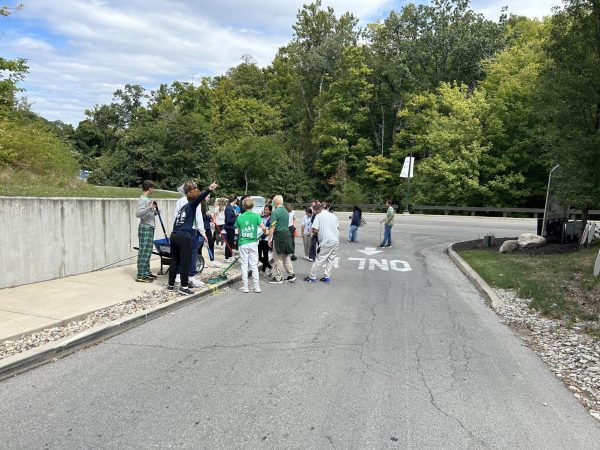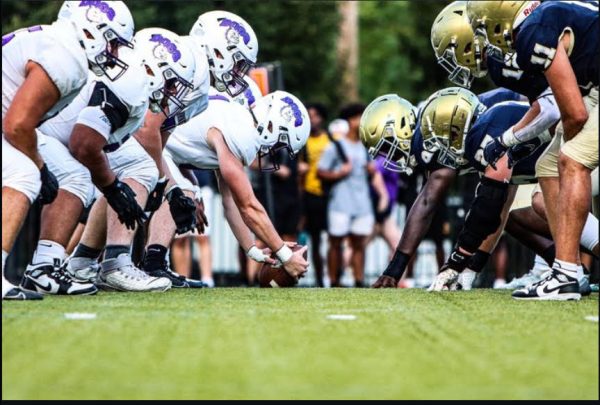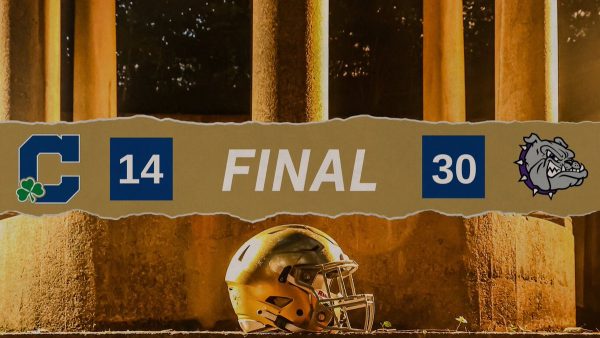Counselor outlines college admissions process
Covid-19 affects ability of seniors to tour campus
Counselor Mrs. Beth Brandes works outside her office on the first floor of Kelly Hall. She outlined steps seniors need to take now to meet initial college application guidelines.
Many seniors are in a frantic rush now trying to juggle school, athletics, extracurriculars and their social lives, so school counselor Mrs. Beth Brandes provided insight and advice to seniors who may be struggling, especially given that the traditional methods of learning more about colleges, such as going on a campus visit, are no longer options.
“With the college application process, (counselors) did our group presentations with the seniors in the classroom and each counselor will be meeting with each senior student to go over those pieces we already covered as a reminder, and so really that’s making sure that students know first and foremost their college application deadlines,” Brandes said.
She added that students should know these steps that go with the application process: they should have a list of schools to apply to and know their deadlines for the application; knowing if an essay or letter of recommendation will be needed or not; how they’re applying (whether that’s regular decision, early action, early decision or rolling decision); what the application type is (either the common application or the institutional application which is unique to a specific college or university); and whether the school will require any additional test such as the SAT or ACT.
Brandes said, “(Applicants need to know) that kind of information as well as if (a student) will be considered for automatic merit scholarships when (they) put in their applications, or if (they) have to apply for scholarships through the college or university separately. Knowing that kind of information as well as the financial aid process for need-based aid, the FAFSA.”
Another component to the application process is the essay, which Brandes referred to as the “black cloud” that’s hanging over students.”They get a lot of those other pieces, which I just mentioned, completed and they save (the essay) for last,” she said.
The program she and fellow school counselor Ms. Kathy Pivonka started last summer, called the Irish College Admissions Prep (ICAP) workshop, which later turned into the 12th grade college resources, is another tool seniors can use for help and guidance with their essay. “It’s one of those pieces that’s nice where you could do it before the school year arrived, and hopefully seniors did. (Students) could take that advice and start working on and composing (their essay).”
Brandes said hopes that seniors have begun working on the essays, if they’re not well on their way already, and have started fine tuning it. She said, “But truly, I would say to really feel good about it and to have it done, I would want seniors to have that done by early to mid October. That would be the goal.”
At this point, she said with what’s been covered from the summer, the classrooms and now with individual senior meetings taking place, there is work to do in Naviance as well. “There’s a few different things you’re going to want to have done, and that is that college list I referred to earlier. (Junior year) that was your ‘Colleges I’m Thinking About’ list, and rolling (the colleges from that list) over into senior year for your ‘Colleges That I’m Applying To.’ That becomes your active list. ‘Colleges That I’m Applying To’ will become your list of schools where you are going to submit an application, that is the list you’ll be working from,” she said.
Once seniors have completed their common application or institutional application, then they will have to request their transcript through Naviance so their counselor can send the necessary materials to a college or university. There are varying deadlines that range from October through December, depending on the college.
The first major deadline for college applications, outside of rolling admissions, will be Nov. 1 in order to be considered for merit scholarships and admission. “There are a few cases in the past, where again the student would need to research and know and be aware and on top of these deadlines, when the deadline was Oct. 15, which is very early,” Brandes said. However, she added that with Covid-19 these deadlines could change, so students will need to make sure of them.
She said that students should give their counselors and teachers at least three weeks prior to the deadline. “To meet that Nov. 1 deadline and to make sure you’re giving your teachers plenty of time to write a recommendation letter if you’re needing one or wanting one and for your counselors to have enough time to process your materials along with their own letter that they need to write, I would definitely have everything to your counselor by Oct. 15 at the absolute latest in order to give them time to meet that Nov. 1 deadline,” Brandes said.
A helpful location where students can find all this information is the 12th grade college resources Google classroom, to which seniors have access through their Google account. Brandes said, “(It’s) what we used for ICAP and what we continue to add resources to. That has every piece of information that I just mentioned, but as well as what we covered since the end of last school year,” she said.
She believes this resource provides what she called a great “checks and balances.” If seniors would want to look over anything or if they’re unsure or have questions, all of that can be found in the Google classroom. “The only thing (seniors) are not going to find and will actually have to know are the deadlines for applications as well as scholarship information,” she said.
Brandes advises seniors to find a way to manage academics, sports, clubs and their social life as well. “Balance is key to everything in this process as well as life in general. I would say this would be a great time to start keeping a calendar, because if you have things written down, it’s easier to assign yourself time to do this around your other required activities like your classes and homework and projects and tasks, and making sure you have free space to do this.
“It can become a social activity. The majority of seniors are working on their college applications or essays. So it doesn’t mean you still can’t hang out; in fact, you can make it a group project of what you’re doing and bounce things off of each other or just be around each other. But of course if you’re going to do that, you still have to adhere to your social distancing and make sure you’re doing all that so everyone can stay safe and healthy,” she said.
Brandes urges students to stay on top of issues especially in regards to the college application process. She said, “Know dates and deadlines, whether it be for school or for college. It’s also great practice because life only tends to get busier, so the better (students) are at organizing their lives and prioritizing things and knowing the events that are a true priority versus something they would just like to do, will be very helpful. It’s a lifelong skill.”
Brandes said, “You have all the resources and support that you need, so make sure that you’re taking advantage of those and you’re using them. And that’s not just the written, the things that you have at your fingertips that have been provided by the school, but also the adults in your life. Your parents, your teachers, your counselors, that you lean on those people, as that’s what they’re here for. We’re here to support you.”

Ava Amos is a senior and is the co-editor-in-chief of the Megaphone staff. She is a member of the varsity softball team and enjoys volunteering with the...







